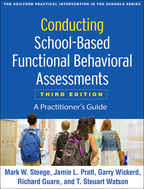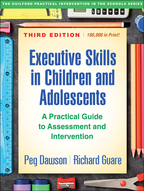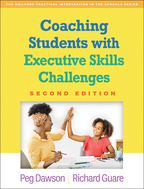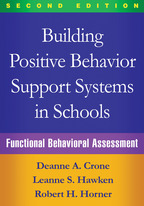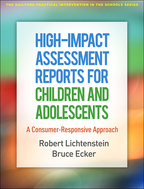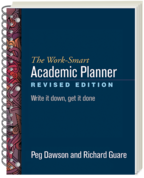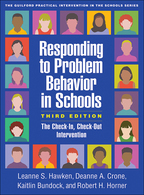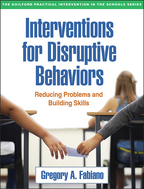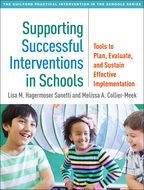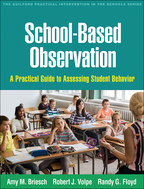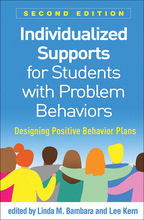Conducting School-Based Functional Behavioral Assessments
Third Edition
A Practitioner's Guide
Mark W. Steege, Jamie L. Pratt, Garry Wickerd, Richard Guare, and T. Steuart Watson
Foreword by Frank M. Gresham
A Paperback Originale-bookprint + e-book
A Paperback Original
orderFebruary 26, 2019
ISBN 9781462538737
Price: $47.00 299 Pages
Size: 8" x 10½"
Read a Q&A with featured author, Richard Guare!
Sign up to receive emails on upcoming titles by Drs. Dawson and Guare (with special discounts)!
Sign up to receive emails on upcoming titles by Drs. Dawson and Guare (with special discounts)!
“A comprehensive handbook for school-based practitioners with updated formatting for thorough function-based evaluations and interventions….It encompasses the classic components of FBA while providing a format for practitioners to incorporate the increasingly significant impact of internalizing emotions, trauma, and skill deficits on behavior. In doing so, it expands upon the traditional components of the FBA and increases its relevance and utility….A user-friendly reference guide that provides the opportunity for practicing school psychologists to brush up on their knowledge of FBA and behavioral theory, increase the specificity and utility of their FBAs, and conduct FBAs that are better suited to the increasingly complex needs of our students.”

—NASP Communiqué
“With this third edition, Steege and associates have once again brought the state of the art (really science) of FBA to a wide range of readers, with new tools and great examples. This is a perfect text for psychology courses in applied behavior analysis as well as education courses in positive behavior support.”

—Wayne Sailor, PhD, Department of Special Education and Co-Director, SWIFT (Schoolwide Integrated Framework for Transformation) Education Center, University of Kansas
“The third edition of this well-respected book not only clearly describes the steps and strategies of FBA—a hallmark of previous editions—but also expands the conversation to include nuanced topics rarely covered in other FBA resources. These topics include the influence of students’ thoughts, emotions, medical issues, and executive skills on school behavior. Through the use of real-life examples involving a variety of students and behavioral challenges, Steege and colleagues effectively convey the compassionate, individualized nature of FBA and the practical idea that the approach is only as good as the interventions and outcomes that result from it.”

—John J. Murphy, PhD, Department of Psychology and Counseling, University of Central Arkansas
“The book offers a very good balance of 'how to' and 'why to.' It is strong in evidence-based research support, and conveys complex theory and praxis in a conversational voice. The ready-to-use, downloadable forms offer outstanding value. The updates in the third edition are important, given the ever-changing populations of students that we see in the practice of school psychology. In a field that prioritizes best practices, I appreciate that the book addresses circumstances where behavioral assessment is completed 'as best as possible' given the multitude of factors in play. This is one of those books I encourage my students to have on their shelves for its timeless tips, tools, and information.”

—Kelly Dean Schwartz, PhD, RPsych, School and Applied Child Psychology Program, University of Calgary, Canada
“This book is organized in a very understandable way. The third edition is even more user-friendly than the second edition; I think my students will find the content easier to grasp and apply. The book is not too prescriptive—it makes clear that every child's individual strengths and needs must be considered. It contains wonderful resources, such as downloadable forms and templates, with filled-out examples to ensure understanding. As a school psychologist for 12 years, one of my favorite parts of the book is the authors' anecdotes and personal stories—they are familiar, illuminating, and entertaining. This book is very applicable for those who conduct FBAs in schools or train other professionals. It really works on both levels.”

—Elizabeth Willis, MS, EdS, NCSP, Lecturer, Educational Specialist in School Psychology Program, Eastern Washington University
“The third edition contains much new material, particularly around executive skill delays and the behavior-analytic problem-solving model. This book is particularly useful for graduate students in school psychology and/or applied behavior analysis programs who have future goals of becoming school-based practitioners. The templates and examples of FBAs contained within the text alone are invaluable resources for both graduate students and early-career professionals.”

—Robyn B. Bratica, PhD, Department of School Psychology, William James College
—NASP Communiqué
“With this third edition, Steege and associates have once again brought the state of the art (really science) of FBA to a wide range of readers, with new tools and great examples. This is a perfect text for psychology courses in applied behavior analysis as well as education courses in positive behavior support.”
—Wayne Sailor, PhD, Department of Special Education and Co-Director, SWIFT (Schoolwide Integrated Framework for Transformation) Education Center, University of Kansas
“The third edition of this well-respected book not only clearly describes the steps and strategies of FBA—a hallmark of previous editions—but also expands the conversation to include nuanced topics rarely covered in other FBA resources. These topics include the influence of students’ thoughts, emotions, medical issues, and executive skills on school behavior. Through the use of real-life examples involving a variety of students and behavioral challenges, Steege and colleagues effectively convey the compassionate, individualized nature of FBA and the practical idea that the approach is only as good as the interventions and outcomes that result from it.”
—John J. Murphy, PhD, Department of Psychology and Counseling, University of Central Arkansas
“The book offers a very good balance of 'how to' and 'why to.' It is strong in evidence-based research support, and conveys complex theory and praxis in a conversational voice. The ready-to-use, downloadable forms offer outstanding value. The updates in the third edition are important, given the ever-changing populations of students that we see in the practice of school psychology. In a field that prioritizes best practices, I appreciate that the book addresses circumstances where behavioral assessment is completed 'as best as possible' given the multitude of factors in play. This is one of those books I encourage my students to have on their shelves for its timeless tips, tools, and information.”
—Kelly Dean Schwartz, PhD, RPsych, School and Applied Child Psychology Program, University of Calgary, Canada
“This book is organized in a very understandable way. The third edition is even more user-friendly than the second edition; I think my students will find the content easier to grasp and apply. The book is not too prescriptive—it makes clear that every child's individual strengths and needs must be considered. It contains wonderful resources, such as downloadable forms and templates, with filled-out examples to ensure understanding. As a school psychologist for 12 years, one of my favorite parts of the book is the authors' anecdotes and personal stories—they are familiar, illuminating, and entertaining. This book is very applicable for those who conduct FBAs in schools or train other professionals. It really works on both levels.”
—Elizabeth Willis, MS, EdS, NCSP, Lecturer, Educational Specialist in School Psychology Program, Eastern Washington University
“The third edition contains much new material, particularly around executive skill delays and the behavior-analytic problem-solving model. This book is particularly useful for graduate students in school psychology and/or applied behavior analysis programs who have future goals of becoming school-based practitioners. The templates and examples of FBAs contained within the text alone are invaluable resources for both graduate students and early-career professionals.”
—Robyn B. Bratica, PhD, Department of School Psychology, William James College

